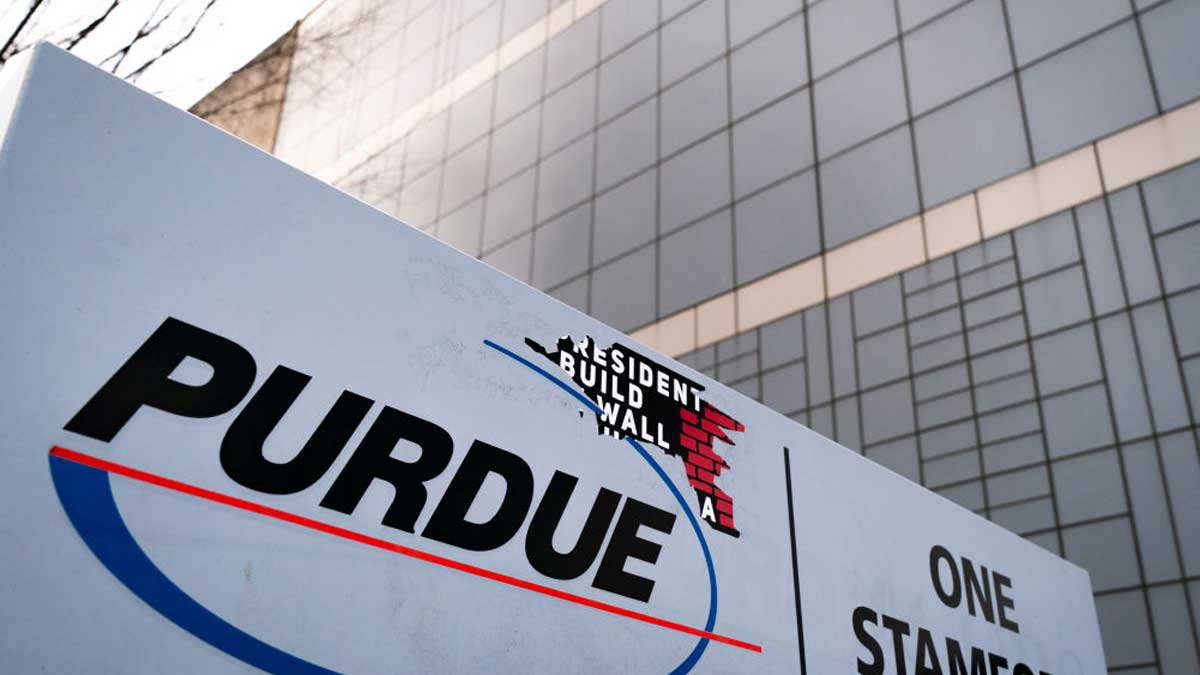- Home
- Billionaires
- Investing Newsletters
- 193CC 1000
- Article Layout 2
- Article Layout 3
- Article Layout 4
- Article Layout 5
- Article Layout 6
- Article Layout 7
- Article Layout 8
- Article Layout 9
- Article Layout 10
- Article Layout 11
- Article Layout 12
- Article Layout 13
- Article Layout 14
- Article Sidebar
- Post Format
- pages
- Archive Layouts
- Post Gallery
- Post Video Background
- Post Review
- Sponsored Post
- Leadership
- Business
- Money
- Small Business
- Innovation
- Shop
Recent Posts
Sacklers Face New Lawsuits After Purdue Pharma Deal Collapses

Purdue Pharma is set to return to court on Tuesday following the Supreme Court’s rejection of the company’s multibillion-dollar bankruptcy settlement. This deal aimed to protect Sackler family members from future civil lawsuits related to their involvement in the opioid crisis, but with the settlement now invalidated, the Sacklers could face new legal challenges if a revised agreement isn’t reached.
The Supreme Court overturned Purdue Pharma’s bankruptcy plan, which had been designed to settle claims from thousands of individuals, states, and other entities accusing the company and certain Sackler family members of contributing to the opioid epidemic. The deal included a provision allowing the Sacklers to pay $6 billion to avoid any further civil litigation. This provision was struck down by the Court, ruling that it was unlawful under the Bankruptcy Code.
The New York bankruptcy judge handling Purdue’s case will conduct a hearing on Tuesday to decide whether to keep the lawsuits against Sackler family members on hold while new settlement negotiations are ongoing. The creditors’ committee, representing entities such as the Blue Cross and Blue Shield Association, CVS, a Texas county government, and several Native American tribes, has requested permission to file new lawsuits against the Sacklers if the settlement talks fall through.
The creditors argue that if a new settlement isn’t reached, litigation is the only remaining option. They contend that while they prefer a settlement, allowing them to sue on behalf of all litigants could expedite the resolution of legal challenges, avoiding the need for multiple separate cases.
Purdue Pharma’s lawyers have indicated that they hope to reach a new settlement but agree that the committee should have the option to sue if negotiations fail. Meanwhile, Sackler family representatives have criticized the committee’s request, claiming it is “riddled with factual errors” and undermines efforts to find a resolution that benefits communities affected by the opioid crisis.
The court’s order keeping the Sackler lawsuits on pause is set to expire on July 29 unless extended. The timeline for reaching a new settlement is uncertain, given that previous negotiations spanned several years. If the committee proceeds with new litigation, the proposed lawsuit seeks unspecified damages, which bankruptcy attorneys suggest could exceed the $6 billion previously agreed upon. The committee’s filing estimates that total damages in lawsuits against the Sacklers could surpass $1 trillion.
As of February, the Sackler family’s net worth was estimated at $5.2 billion, derived from $11.2 billion in liquid assets minus the $6 billion they were set to pay under the settlement. The opioid litigation and bankruptcy proceedings involve only the Sackler descendants of Mortimer and Raymond Sackler, who previously led Purdue Pharma and are now deceased.
In a statement, the creditors’ committee emphasized the need for prompt action, asserting that justice for victims should not be delayed any longer. They advocate for permission to initiate lawsuits so that the lengthy legal battles can begin and conclude swiftly.
Sackler family members, who no longer have ties to Purdue Pharma, have previously stated that they acted within legal bounds. They acknowledged that OxyContin, a product linked to the opioid crisis, has caused significant harm but expressed hope for a resolution that provides substantial resources to combat the public health crisis. They lamented the potential for “costly and chaotic legal proceedings” and remain confident in their ability to prevail in future litigation despite the contentious nature of the case.
Purdue Pharma’s bankruptcy filing in 2019 was part of a broader response to the fallout from the aggressive marketing of OxyContin, which is blamed for exacerbating the opioid epidemic. The creditors’ committee alleges that the Sacklers exerted undue influence over the company’s operations, pressuring it to boost sales of OxyContin and dispense opioids inappropriately, in violation of federal law. The Sacklers have faced widespread condemnation, numerous lawsuits, and the removal of their names from various cultural institutions.
In 2022, Purdue Pharma and its creditors reached a settlement allowing the Sacklers to escape further civil liability while paying $6 billion. However, the federal government challenged the agreement, leading the Supreme Court to rule in June that the settlement was invalid. The Court found that the provision shielding the Sacklers from liability exceeded the limitations of federal bankruptcy law, ruling that such protection should only apply if the Sacklers themselves were filing for bankruptcy, not Purdue Pharma.
Recent Posts
Categories
- 193cc Digital Assets2
- 5G1
- Aerospace & Defense46
- AI37
- Arts3
- Banking & Insurance11
- Big Data3
- Billionaires449
- Boats & Planes1
- Business328
- Careers13
- Cars & Bikes76
- CEO Network1
- CFO Network17
- CHRO Network1
- CIO Network1
- Cloud10
- CMO Network18
- Commercial Real Estate7
- Consultant1
- Consumer Tech180
- CxO1
- Cybersecurity68
- Dining1
- Diversity, Equity & Inclusion4
- Education7
- Energy8
- Enterprise Tech29
- Events11
- Fintech1
- Food & Drink2
- Franchises1
- Freelance1
- Future Of Work2
- Games141
- GIG1
- Healthcare78
- Hollywood & Entertainment186
- Houses1
- Innovation42
- Investing2
- Investing Newsletters4
- Leadership65
- Lifestyle11
- Manufacturing1
- Markets20
- Media193
- Mobile phone1
- Money13
- Personal Finance2
- Policy567
- Real Estate1
- Research6
- Retail1
- Retirement1
- Small Business1
- SportsMoney33
- Style & Beauty1
- Success Income1
- Taxes2
- Travel10
- Uncategorized8
- Vices1
- Watches & Jewelry2
- world's billionaires418
Related Articles
Trump Moves $4B Stake in Truth Social Parent, Stock Drops 6%
Donald Trump recently transferred his 57% stake in Trump Media & Technology...
By 193cc Agency CouncilDecember 20, 2024House Rejects Trump-Backed Funding Bill, Shutdown Looms
The U.S. House of Representatives rejected a new government funding bill on...
By 193cc Agency CouncilDecember 20, 2024Trump Named Time’s Person of the Year for Second Time
On Thursday, Time magazine honored Donald Trump as its “Person of the...
By 193cc Agency CouncilDecember 12, 2024Meta Donates $1 Million to Trump’s Inaugural Fund
Meta, the parent company of Facebook and Instagram, has confirmed a $1...
By 193cc Agency CouncilDecember 12, 2024















Leave a comment